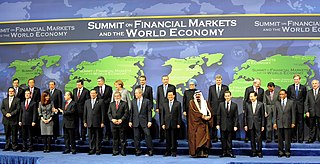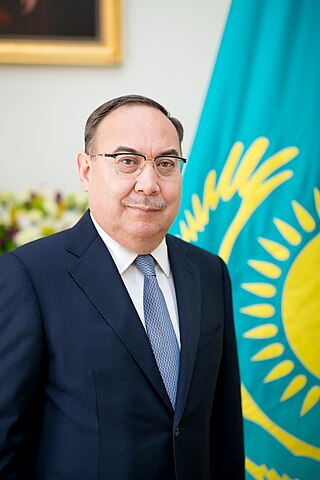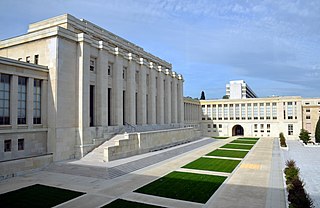
Foreign relations of Kazakhstan are primarily based on economic and political security consideration. The Nazarbayev administration has tried to balance relations with Russia and the United States by sending petroleum and natural gas to its northern neighbor at artificially low prices while assisting the U.S. in the War on Terror. Kazakhstan is a member of the United Nations, Collective Security Treaty Organization, Organization for Security and Co-operation in Europe, North Atlantic Cooperation Council, Commonwealth of Independent States, the Shanghai Cooperation Organisation, and NATO's Partnership for Peace program. Kazakhstan established a customs union with Russia and Belarus which eventually became the Eurasian Economic Union. President Nazarbayev has prioritized economic diplomacy into Kazakhstan's foreign policy.

The United Nations Economic Commission for Europe is one of the five regional commissions under the jurisdiction of the United Nations Economic and Social Council. It was established in order to promote economic cooperation and integration among its member states.

International relations (IR), are the interactions among sovereign states. The scientific study of those interactions is also referred to as international studies, international politics, or international affairs. In a broader sense, the study of IR, in addition to multilateral relations, concerns all activities among states—such as war, diplomacy, trade, and foreign policy—as well as relations with and among other international actors, such as intergovernmental organizations (IGOs), international nongovernmental organizations (INGOs), international legal bodies, and multinational corporations (MNCs).

A trade agreement is a wide-ranging taxes, tariff and trade treaty that often includes investment guarantees. It exists when two or more countries agree on terms that help them trade with each other. The most common trade agreements are of the preferential and free trade types, which are concluded in order to reduce tariffs, quotas and other trade restrictions on items traded between the signatories.
In international relations, power is defined in several different ways. Material definitions of state power emphasize economic and military power. Other definitions of power emphasize the ability to structure and constitute the nature of social relations between actors. Power is an attribute of particular actors in their interactions, as well as a social process that constitutes the social identities and capacities of actors.

Foreign policy, also known as external policy, is the set of strategies and actions a state employs in its interactions with other states, unions, and international entities. It encompasses a wide range of objectives, including defense and security, economic benefits, and humanitarian assistance. The formulation of foreign policy is influenced by various factors such as domestic considerations, the behavior of other states, and geopolitical strategies. Historically, the practice of foreign policy has evolved from managing short-term crises to addressing long-term international relations, with diplomatic corps playing a crucial role in its development.
In international relations, multilateralism refers to an alliance of multiple countries pursuing a common goal. Multilateralism is based on the principles of inclusivity, equality, and cooperation, and aims to foster a more peaceful, prosperous, and sustainable world. Middle powers play a crucial role in the international system by promoting multilateralism and internationalism.

A middle power is a state that is not a superpower or a great power, but still exerts influence and plays a significant role in international relations. These countries often possess certain capabilities, such as strong economies, advanced technologies, and diplomatic influence, that allow them to have a voice in global affairs. Middle powers are typically seen as bridge-builders between larger powers, using their diplomatic skills to mediate conflicts and promote cooperation on international issues.
Bilateralism is the conduct of political, economic, or cultural relations between two sovereign states. It is in contrast to unilateralism or multilateralism, which is activity by a single state or jointly by multiple states, respectively. When states recognize one another as sovereign states and agree to diplomatic relations, they create a bilateral relationship. States with bilateral ties will exchange diplomatic agents such as ambassadors to facilitate dialogues and cooperations.
European integration is the process of industrial, economic, political, legal, social, and cultural integration of states wholly or partially in Europe, or nearby. European integration has primarily but not exclusively come about through the European Union and its policies.

The politics of Europe deals with the continually evolving politics within the continent of Europe. It is a topic far more detailed than other continents due to a number of factors including the long history of nation states in the region as well as the modern day trend towards increased political unity amongst the European states.

Japan is a middle power and a member of numerous international organizations, including the United Nations, the OECD, and the Group of Seven. Although it has renounced its right to declare war, the country maintains Self-Defense Forces that rank as one of the world's strongest militaries. After World War II, Japan experienced record growth in an economic miracle, becoming the second-largest economy in the world by 1990. As of 2021, the country's economy is the third-largest by nominal GDP and the fourth-largest by PPP.

Regional Integration is a process in which neighboring countries enter into an agreement in order to upgrade cooperation through common institutions and rules. The objectives of the agreement could range from economic to political to environmental, although it has typically taken the form of a political economy initiative where commercial interests are the focus for achieving broader socio-political and security objectives, as defined by national governments. Regional integration has been organized either via supranational institutional structures or through intergovernmental decision-making, or a combination of both.

Erzhan Hozeuly Kazykhanov is a Kazakh politician who serves as diplomat. Kazykhanov holds a newly created position in the presidential administration with the title of Special Representative for International Cooperation. Prior to his appointment as the Ambassador to the U.S., Kazykhanov has served as Kazakhstan's Ambassador to the United Kingdom of Great Britain and Northern Ireland. Before becoming Ambassador to the UK, he held the position of Assistant to the President of the Republic of Kazakhstan and Minister of Foreign Affairs of Kazakhstan. He previously served as the Deputy Minister of Foreign Affairs of Kazakhstan, as well as the Ambassador of Kazakhstan to Austria, Permanent Representative of Kazakhstan to the International Organizations in Vienna and Permanent Representative to the United Nations in New York.
Economic diplomacy is a form of diplomacy that uses the full spectrum of economic tools of a state to achieve its national interests. The scope of economic diplomacy can encompass all of the international economic activities of a state, including, but not limited to, policy decisions designed to influence exports, imports, investments, lending, aid, free trade agreements, among others.

An international organization, also known as an intergovernmental organization or an international institution, is an organization that is established by a treaty or other type of instrument governed by international law and possesses its own legal personality, such as the United Nations, the World Health Organization, International Union for Conservation of Nature, and NATO. International organizations are composed of primarily member states, but may also include other entities, such as other international organizations, firms, and nongovernmental organizations. Additionally, entities may hold observer status.

Diplomacy comprises spoken or written communication by representatives of state, intergovernmental, or non-governmental institutions intended to influence events in the international system.
Sea transport accounts for most of the European Union's external and internal commerce. The EU is the world's third-largest importer of fisheries and aquaculture products and the fifth-largest producer. Maritime borders make up more than 70% of the Union's external borders, and hundreds of millions of travelers pass through European ports each year. The security of Europe's energy supply is heavily reliant on marine transit and infrastructure. The significant expansion of EU Member States' fleets, as well as suitable port infrastructure, contribute to a well-functioning energy market and supply security, and hence to European residents' and the European economy's overall well-being. The Arctic region is therefore a vital new area for the EU to work towards and a new strategy for the Arctic region that matches with the European Green deal was established in late 2021.

The Arctic Policy of the Kingdom of Denmark defines the Kingdom's foreign relations and policies with other Arctic countries, and the Kingdom's strategy for the Arctic on issues occurring within the geographic boundaries of "the Arctic" or related to the Arctic or its peoples. In order to clearly understand the Danish geopolitical importance of the Arctic, it is necessary to mention Denmark's territorial claims in areas beyond its exclusive EEZ in areas around the Faroe Islands and north of Greenland covering parts of the North Pole, which is also claimed by Russia.
In international relations, migration diplomacy is 'the use of diplomatic tools, processes, and procedures to manage cross-border population mobility,' including 'both the strategic use of migration flows as a means to obtain other aims, and the use of diplomatic methods to achieve goals related to migration.' Migration has come to constitute an increasingly-important area of states' engagement with one another, with bilateral multilateral strategies including the promotion or discouragement of bilateral migratory flows; agreements on preferential treatment to certain foreign nationals; the initiation of guest-worker programmes or other short-term labor migration schemes; the deportation of foreign nationals; and so on.












